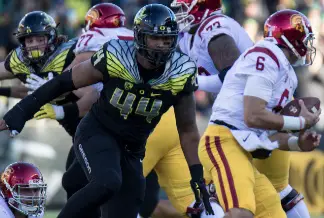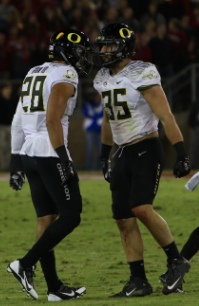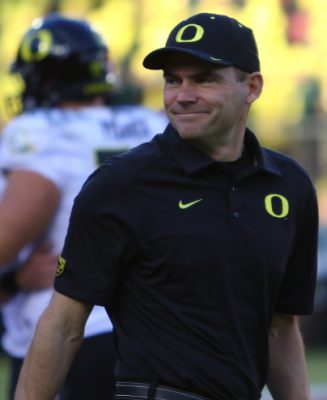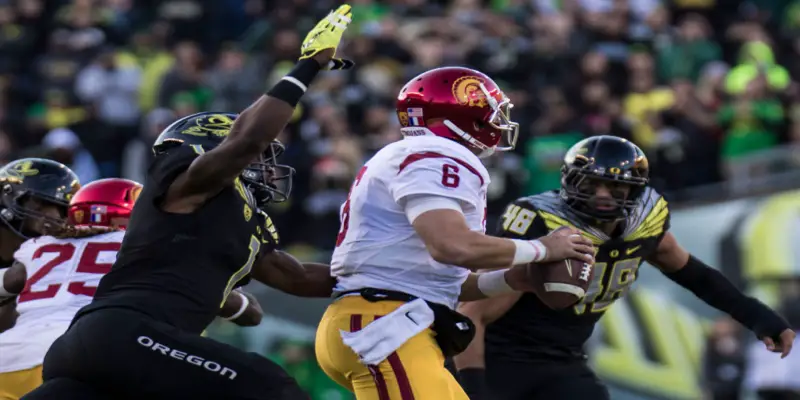Although Oregon has now been a winning program for more than 25 years (dating to the 1989 Independence Bowl season), and much of that success has been due to the continuity of its coaching staff — with assistants like Don Pellum, Steve Greatwood and John Neal‘s tenures stretching across multiple head coaching regimes — there have always been necessary course corrections.
Think back to 2005, for example, when Mike Bellotti‘s first losing year (the year before, 2004) prompted the coach to switch to the spread offense. It wasn’t an overnight success, but the move ultimately enabled the glory years that have come since then.
This offseason is one of those times, when it’s not just personnel but a philosophy change that is arguably necessary.
Mark Helfrich is already changing out his top lieutenants on each side of the ball, losing offensive coordinator Scott Frost to a head coaching job at Central Florida, and deciding to demote defensive coordinator Pellum back to linebackers coach after a disastrous 2015 (in which the team finished as the Pac-12’s worst scoring defense and gave up 47 points after halftime in the catastrophic Alamo Bowl).

DeForest Buckner closing in on a sack!
For the offense, most of us hope to more or less continue Oregon’s success, with a spread-offense blueprint laid out by Bellotti and tweaked to perfection by Chip Kelly. In Helfrich’s first three years, he has proven just as adept as his more revered predecessor. Sometimes Oregon has introduced more new plays and schemes over this trio of campaigns than Kelly did in Philadelphia. Pretty much everyone agrees that while Kelly may run more and Helfrich may pass more, the offense is a Ferrari that only needs the occasional tuneup.
But on defense, while individual games have seen great success — like last year’s Rose Bowl, arguably won by all the turnovers caused — it has seemingly been many years since any Duck defensive unit was considered anything close to dominant.
But while some cheered the demotion Helfrich made on Monday, maybe getting rid of Pellum as defensive coordinator is not as important as changing philosophy.
Pellum was in many ways a continuation of the philosophies of his predecessor, Nick Aliotti, under whom he served for the better part of two decades. These Aliotti-Pellum defenses have relied on confusing the other team with multiple coverages, which at times has worked brilliantly but has also had moments of utter embarrassment.
In the short time since Pellum’s demotion was announced Monday, speculation about the next defensive coordinator has been all about names. How about former Duck Josh Wilcox, who has been a defensive coordinator at Boise State, LSU, Washington and USC? How about Peter Sirmon, another talented young coordinator who played in Eugene? Or what if Helfrich were to find a talented outsider, as Bellotti did in 1995 with the very successful choice of defensive coordinator Charlie Waters? (Unfortunately Waters left after one season due to the death of his son.)

No. 35 Joe Walker wants to keep it simple, and the blood on his knees prove it. Johnny Ragin, No. 28, agrees
Instead of names, though, maybe we should be thinking of the defensive approach. If the confuse-your-opponents strategy has largely failed, what is its opposite? A simple, attacking defense that is fine with offenses knowing what it’s going to do, because its players are ready to out-execute their opponents.
The best current example of this simple attacking defense may be the best one in the National Football League over the past few years: the Seattle Seahawks. When the team won the Super Bowl two years ago, it was arguably with one of the most dominant defensive performances in NFL history, ranking with the 1985 Chicago Bears and the quartet of Super Bowl winning squads fielded by the 1970s Pittsburgh Steelers. And for Pete Carroll‘s squad, the likes of Richard Sherman and Earl Thomas never have relied on subterfuge to halt and punish opposing offenses. No matter what audibles that even Hall of Fame quarterbacks like Peyton Manning and Drew Brees have called, Seattle’s defense has not only held them to season-low yardage and point averages but outright intimidated them along the way.
Certainly any defensive scheme is only as good as the players playing it. Much of Oregon’s defensive difficulty in 2015 came down to inexperience at positions like defensive back, which like the quarterback position succumbed to injuries that couldn’t be overcome. But that inexperience was arguably exacerbated to a large degree because the young players on the field found themselves regularly out of position or at least having to think too much to get there fast enough. One could argue that Oregon’s latter-season success during the six-game winning streak to end the regular season came about in large part because Duck players learned to do their jobs in Pellum’s system, and once that happened, we looked like a National Championship-caliber team again.

Good times like the USC win will return…
Even so, 2015 is far from the first time that Oregon’s defense has suffered. Some of that can be ascribed to the fact that the offense has the ball for very little time compared to most successful offenses. But the reality is that the Ducks have fielded many exceptionally talented defensive players over the past decade, and yet often been pasted for avalanches of touchdowns.
By no means should Helfrich burn the house down. His retaining of Pellum on the staff in his old linebackers-coach position is a great testament to the loyalty and continuity of the Ducks program, something that is Oregon’s brand as much as changing uniforms or fast-breaking no-huddle offenses. Yet if the Ducks program really does embody the notion of change and newness while the Alabamas and Notre Dames of the world stick to the same plan for generations, we should be unafraid to go in another direction.
Employing a simple, attacking defense can be done while retaining great assistants like Pellum and Neal, and it can be done in a way that embodies Oregon’s football mantra: fast, hard, finish. It might even be a truer manifestation of that mantra. Players play fastest and hardest when their moves are instinctual. What’s the defensive equivalent of an offense that makes its opponents suck wind? A squad that knocks the wind out of them: fast to the ball, hard hitting, and finishing the job before the offense knew what hit them.
Top Photo by Gary Breedlove
Brian Libby is a writer and photographer living in Portland. A life-long Ducks football fanatic who first visited Autzen Stadium at age eight, he is the author of two histories of UO football, “Tales From the Oregon Ducks Sideline” and “The University of Oregon Football Vault.” When not delving into all things Ducks, Brian works as a freelance journalist covering design, film and visual art for publications like The New York Times, Architect, and Dwell, among others.

